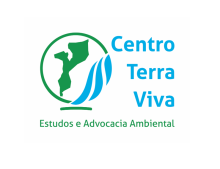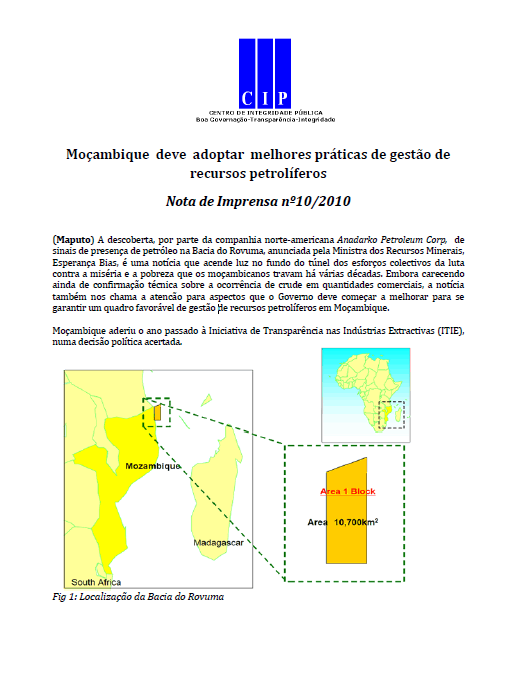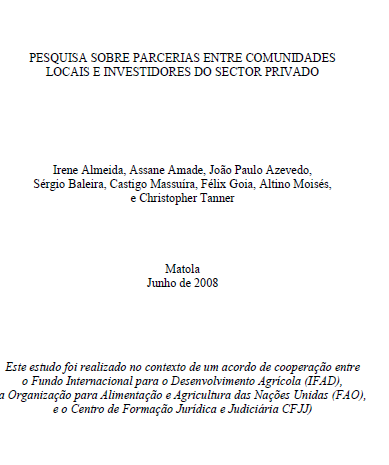
Topics and Regions
Details
Location
Contributions
Displaying 111 - 120 of 223Moçambique deve adoptar melhores práticas de gestão de recursos petrolíferos
A descoberta, por parte da companhia norte-americana Anadarko Petroleum Corp, de sinais de presença de petróleo na Bacia do Rovuma, anunciada pela Ministra dos Recursos Minerais, Esperança Bias, é uma notícia que acende luz no fundo do túnel dos esforços colectivos da luta contra a miséria e a pobreza que os moçambicanos travam há várias décadas.
Pesquisa sobre parcerias entre comunidades locais e investidores do sector privado
A Lei de Terras de Moçambique foi aprovada em Outubro de 1997 e é amplamente reconhecida como um passo político e legislativo inovador no contexto do continente africano. A lei tem como base a Política Nacional de Terras de 1995, que na sua declaração central, ou „mission statement’, oferece o esboço de uma estratégia de desenvolvimento rural onde a questão chave é como compartilhar os direitos sobre a terra entre ´o povo´ de um lado, e ´o investidor´, de outro:
MOzambique's innovative land law
A law can be a powerful tool for poverty alleviation and rural development.
In most developing countries, a majority of the population lives in rural
areas. Most rural residents—and especially the poorest people—depend
on the land for their livelihoods and long-term social security. Laws that
give people access and secure rights to land and encourage investment in
the land can establish a foundation on which rural families can grow their
incomes and assets. Good land laws can help create an environment that
MOzambique's innovative land law
A law can be a powerful tool for poverty alleviation and rural development.
In most developing countries, a majority of the population lives in rural
areas. Most rural residents—and especially the poorest people—depend
on the land for their livelihoods and long-term social security. Laws that
give people access and secure rights to land and encourage investment in
the land can establish a foundation on which rural families can grow their
incomes and assets. Good land laws can help create an environment that
MOzambique's innovative land law
A law can be a powerful tool for poverty alleviation and rural development.
In most developing countries, a majority of the population lives in rural
areas. Most rural residents—and especially the poorest people—depend
on the land for their livelihoods and long-term social security. Laws that
give people access and secure rights to land and encourage investment in
the land can establish a foundation on which rural families can grow their
incomes and assets. Good land laws can help create an environment that
Sustainable livehoods in Southern Africa
The concept of use and benefit from natural resources for local communities in Mozambique occupies a central position in the formal government vision for rural development and has been given prominence in the policies that govern access to land use rights and forest and wildlife resources. There are constitutional guarantees that recognise rights to land that have been acquired through occupation or inheritance through customary systems of allocation, and enabling legislation that permits the registration of these hitherto ‘informal’ rights.
comunity investor partnerships in Mozambique
Private investment is critical to Mozambique’s development strategy.
Investment can stimulate the rural economy by helping to modernize the
agriculture sector, provide rural employment, and establish new markets
and market linkages. Private investment can fund the development of
Challengs in Mozambique In Implamatation of Mozambique's progressie land Law
This series of briefs has focused on the importance of a legal framework
for land that fosters tenure security for rural citizens and provides a foundation forv equitable and vigorous rural development. However, good laws alone do not assure genuine reform. The effectiveness of a law depends on adequate capacity and the will to implement the law. In the case of land legislation, this applies to both those who claim rights— typically individuals, communities or firms—and those who administer land rights, namely the government and and legitimate non-state authorities (e.g.,
Mozambique: food Security and land governance
Mozambique has a land governance system that allows for strong protection of community-based land rights, community consultation with respect to partnerships with investors, and also secure rights to land for investors. However, the implementation of legislation has been slow and the capacity among state actors is weak. Tensions exist between a government keen on promoting foreign investment and agro-industry and a rural population that is insufficiently aware of and not always able to exercise their legal rights.
Land rights and enclosures: implementing the Mozambican land law in practice
Post-war Mozambique confronted the challenge of reforming land policy and legislation
with an innovative land law that protects customary rights while promoting investment
and development. Most rural households have customarily acquired land rights, now
legally equivalent to an official State land use right. When necessary, they can be proven
by analysing local land management and production systems, resulting in large areas









